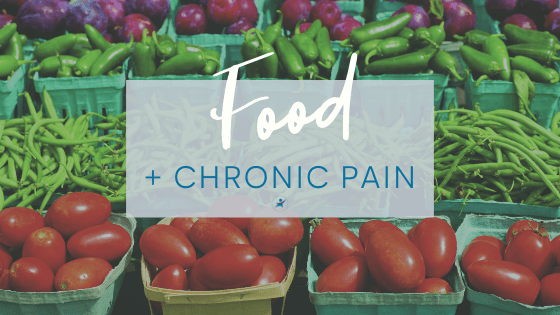Chronic Pain + Nutrition: Tips and Info
Chronic pain can have a number of causes, including illness, disease and inflammation.
Inflammation, in fact, plays a key role in several pain-causing chronic diseases, like rheumatoid arthritis and lupus.
While acute inflammation is a beneficial physiological response that alerts us to bodily harm like cuts or infections, chronic inflammation is a long-term dilation of blood vessels and heightened immune system response. This response is not beneficial, and in fact, causes multiple problems within the body.
By now, we’ve learned just how bad chronic inflammation is for the body.
Uncontrolled inflammation has been linked to diabetes, stroke, and heart disease, among other diseases. While medication and physical therapy can both help control inflammation , another factor to consider is nutrition. Nutrition can play an important role in the level of inflammation in the body.
For National Nutrition Month , we’re examining the relationship between inflammation and diet.
What Is Inflammation?
Inflammation is the immune system’s beneficial physiological response to a perceived threat such as harmful bacteria, injury or infection.
During an inflammatory response, your body releases certain chemicals, including white blood cells called phagocytes, that ingest bacteria, dead cells, and other foreign invaders to the body.
This type of inflammation is known as acute inflammation. Once the threat to the body’s tissues has passed, the body returns to a non-inflammatory state.
Sometimes, the body remains in a state of inflammation long after a physiological threat has passed. This is called chronic inflammation. The most common causes of chronic inflammation are autoimmune diseases like rheumatoid arthritis, lupus, and ankylosing spondylitis.
Chronic inflammation is linked to a number of conditions and health events, including heart disease, stroke, cancer , and neurodegenerative diseases , like Alzheimer’s Disease.
Can Certain Foods Reduce Inflammation?
Diet can play an important part of controlling inflammation levels in the body.
In general, anti-inflammatory diets should include the following foods:
- Green leafy vegetables (spinach, kale)
- Fish containing omega-3 fatty acids (salmon, shrimp, mackerel, albacore tuna)
- Beans (black beans, chickpeas, pinto beans, black-eyed peas)
- Berries (blueberries, strawberries, raspberries)
- Avocados
- Olive Oil
As always, it’s important to talk to your doctor before starting any diet. He or she can give you advice on the foods most likely to reduce inflammation while still offering you the nutrients your body needs.
Can Certain Foods Increase Inflammation?
There is evidence to suggest that some foods cause an uptick in inflammation.
According to arthritis.org , these foods may cause inflammation:
- Refined sugar. Sugar that is added to foods by a manufacturer has been linked to a number of inflammatory responses in the body, including increased insulin resistance. Sugar is linked to chronic low-grade inflammation, obesity and high blood pressure. Sodas, sugary cereals, concentrated fruit juices, and candy are all abundant in refined sugars. Some studies show that 74% of packaged foods contain refined sugar.
- Saturated fats. Saturated fats, like those found in red meat, pasta, and cheese, have been linked to increased C-reactive protein, which is produced by the liver in response to inflammation.
- Excess alcohol. Drinking more than two alcoholic beverages per day has been linked to intestinal inflammation by altering the intestinal microbiota.
- Refined carbohydrates. Foods high in refined carbohydrates, like white bread, white rice, and refined pasta, can contribute to a spike in blood sugar that in turns raises the body’s inflammation markers.
Of course, these aren’t the only foods that can cause inflammation. Your unique dietary needs should always be addressed when choosing an anti-inflammatory diet.
Comprehensive Pain Management at PTCOA
An anti-inflammatory diet is only one piece of your pain management plan.
If you suffer from long-term chronic pain, you may have a physical condition or disease that requires clinical treatment and lifestyle changes.
Pain Treatment Centers of America offers 11 convenient pain clinics around the state of Arkansas. Our comprehensive pain management clinics offer diagnosis and treatment for a variety of pain conditions and symptoms. We also offer state-of-the-art surgery centers and renowned pain treatment specialists who are dedicated to helping each patient get back to living.
Make your appointment with PTCOA by calling (844) 215-0731 today.














